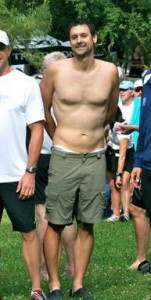If there is a picture of a slender frame in the athletic community, it is the swimmer. Their bodies are trained for endurance and burning massive amounts of calories. So, that makes today’s weight loss success story all the more intriguing.
Matthew Schonwalder is a former collegiate athlete, a swimmer for the University of North Carolina. In 1994, Matthew was a slender 165 pounds, in his 6′ 2″ frame. But, when he gave up his athletic ambitions to focus on improving his grades, that is when the weight began to skyrocket.
While Matthew stopped swimming, his caloric intake stayed the same (remember, Olympian Michael Phelps admitted to 12,000 calories a day).
In early 2026, Matthew hit 240 pounds, with a total cholesterol of 238. The American Heart Association categorizes anything at 240 mg/dL or above as “high risk.” His blood pressure was high, too.
Matthew says that he ate “at least six heavy meals per week of fast food. After all, from the time I was seven years old, until I was 19 years old, my brain was trained to consume lots of calories to keep up with my burn!”
It was then that Matthew began to commit to change, with a newfound commitment to exercise and improving his food intake. After a lot of hard work and dedication, Matthew’s weight has remained at 172 pounds since the fall of 2026. We interviewed Matthew, to hear how he went from elite athlete, to overweight, back to athlete again:
As a former athlete, what changed mentally that had you gaining weight?
The change started first with the end of my swimming career, at which point I refocusing myself on school. For most of my life, I really focused on my sport more than anything else (luckily, I was one who did well academically without much effort). I suppose the concept of “life balance,” contrary to what some might think about athletes, actually wasn’t well ingrained in me.
When I dropped the athletic focus, it went entirely toward academics… and I neglected physical activity almost entirely after I ended my swimming career. After completing graduate school, I focused almost entirely on work; again, neglecting physical activity. I had almost a one-track mind. But my appetite for loads of calories was still in play even when my burn was not!
What was it that made you think “enough is enough”?
A few things built up to that moment. My cholesterol and blood pressure were on the rise (and I already have bad genes in those regards). Then my son was born, and I knew I needed to do something. But for me, the defining moment was looking at a picture taken around Christmas of 2005 and hardly recognizing myself. My face was enormous. I was embarrassed that I had let myself go that far. That was when I was at my peak of 240 pounds (up from a lean 165 when swimming competitively).
Where I used to eat fast food probably 6-10 meals per week (lunches and dinners together), I instead made smarter choices for lunch at the cafeteria at work. Burgers and fries turned into turkey sandwiches and low-fat chips. I ate a lot more fish (salmon, tuna, mahi, halibut) at home for dinner. I never tried to substitute. For instance, I never tried to make some kind of low-fat pizza. If I wanted pizza, I just ate the real deal. I just ate it less frequently…. and I didn’t eat an entire large! I ate more Mediterranean foods… hummus, tabouli, etc.
As an aside, I heard it said on “People’s Pharmacy with Joe and Terry Graden” (a radio show on NPR) one time that we are genetically engineered to primarily eat “fruits, nuts, grains, and the very occasional mastodon leg.” I try (sometimes successfully, sometimes not) to remember that when I’m craving fatty red meats or cheeses.
Did you follow a structure diet or brand name plan?
Not really. I more constructed a healthier diet on my own that fit with my own personal tastes. If I followed any general rules of thumb (though not strictly), they were (and are) the following:
1. As above, some unknown guest on a radio show said “we’re engineered to eat fruit, nuts, grains, and the very occasional mastodon leg.”
2. I knew that many Pan-Asian cultures (generally thinner cultures) use meat more as a garnish than a main course.
3. I do personally agree with the anthropological theory that humans migrated around the world following coastlines… and as such, we are also biochemically engineered to eat a lot of fish.
4. Moderation, moderation, moderation. I never deprived myself of those foods I craved. Nor did I use them as “rewards.” I simply ate them much less frequently, which was fine, since I enjoyed the new foods I was eating.
What, if any, are your favorite “unhealthy” foods that you occasionally indulge in?
Pizza has always been my downfall. Even now, I can eat a lot of pizza. Strangely, though, where I used to eat a whole large without any problem, now I eat half a large and can’t eat any more… even though I burn a lot of calories with my triathlon training. Second to that would be a blue cheese burger, which I mostly indulge in now after a tough race.
What was your workout during your weight loss? What do you do now?
When I started, I woke up early three times per week and ran two miles each time. I stopped at each mile marker and did push ups. That was it. This slowly built up to four times per week. Then three miles instead of two. Then one run per week would be five miles with the others smaller. It really was a gradual build, but I stayed on top of it because the weight was slowly coming off, and I was encouraged.
In the middle of 2026 I was running 5-6 miles per run, 4-5 days per week. Then I decided I wanted to run a full marathon. I did it six months later.
My workout schedule now is:
- Mon, Wed, Fri – 5:30 a.m., swim for one hour plus run 6.2 miles at lunch
- Tues, Thurs: 5:30 a.m. spin class
- Sat: long run (8-15 miles) and maybe another one-hour swim
- Sun: long bike ride (20-40 miles) – but only if the weather is good – sometimes I take the day off.
To maintain this schedule does take some dedication. I go to bed at 9 p.m. most nights and I watch an average of 45 minutes of TV per evening (thank God for DVR). But I also have family time every evening, and I’m able to get all my work done and not sacrifice career. On the weekends, and at races, my kids (two and four years old) see my healthy lifestyle and want to be like me…. in fact my four-year-old will be running a one-mile race in just a few weeks and he’s VERY excited about it!
What is the key to your long-term weight loss success?
As a former athlete, I’m driven by goals that aren’t too far off into the future. I’m driven to improve. I always need to have a race in my future (1-3 months out) that I’m training for. I recently completed my second Half-Ironman, and three weeks later (last weekend) I swam a one-mile open water race. I have one race per month this year and I look forward to each and every one of them… and when my alarm goes off at 5 a.m., and I want nothing more than to roll over and go back to sleep, I think “but I have that race in three weeks, and I need to be prepared.” Then I get up and go to it. I plan to enter races like this for the rest of my life. As I age, I may be limited to lower impact sports (maybe stop running), but I’ll take a bum knee over a heart attack any day!
Any final thoughts or advice you would like to give readers?
To the former athletes out there: tap into your natural drive to compete. Compete not necessarily with others, but with yourself… to improve yourself. You’ll soon realize that there is a big part of who you are that has been neglected ever since your athletic career ended. Embrace that in yourself and make it, once again, part of your definition of self.
And to those who are NOT former athletes: sign up for a race. Run, swim, bike, or whatever it is that interests you. After you complete it, you might just find yourself addicted to the sense of accomplishment and want to do another, and another. If that happens, you’ll soon find that attention to nutrition will naturally follow and you’ll WANT to eat healthier.
Have you lost a significant amount of weight? Tell us your True Weight Loss Story… and maybe you will be featured in a future Diets in Review article!



